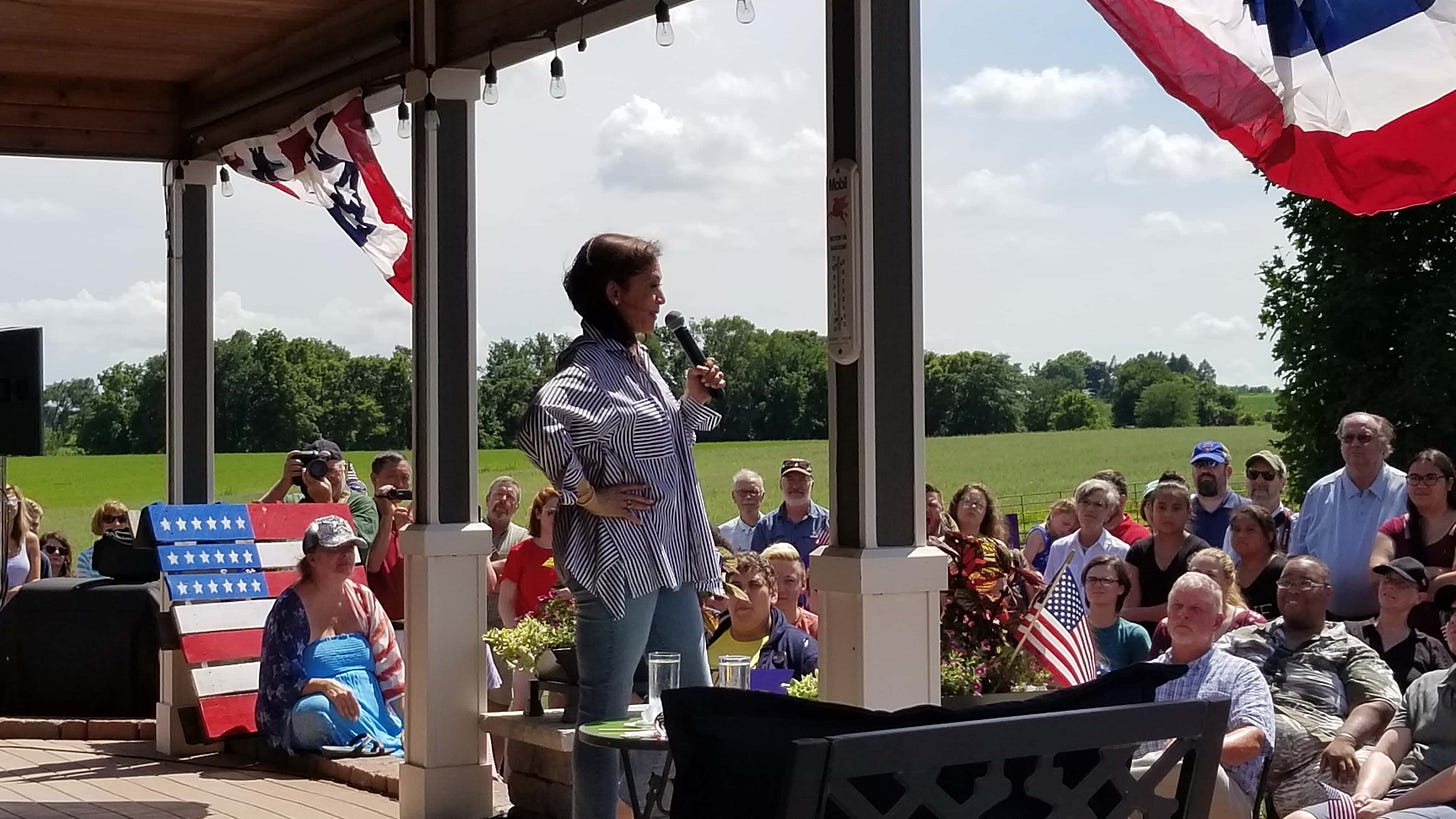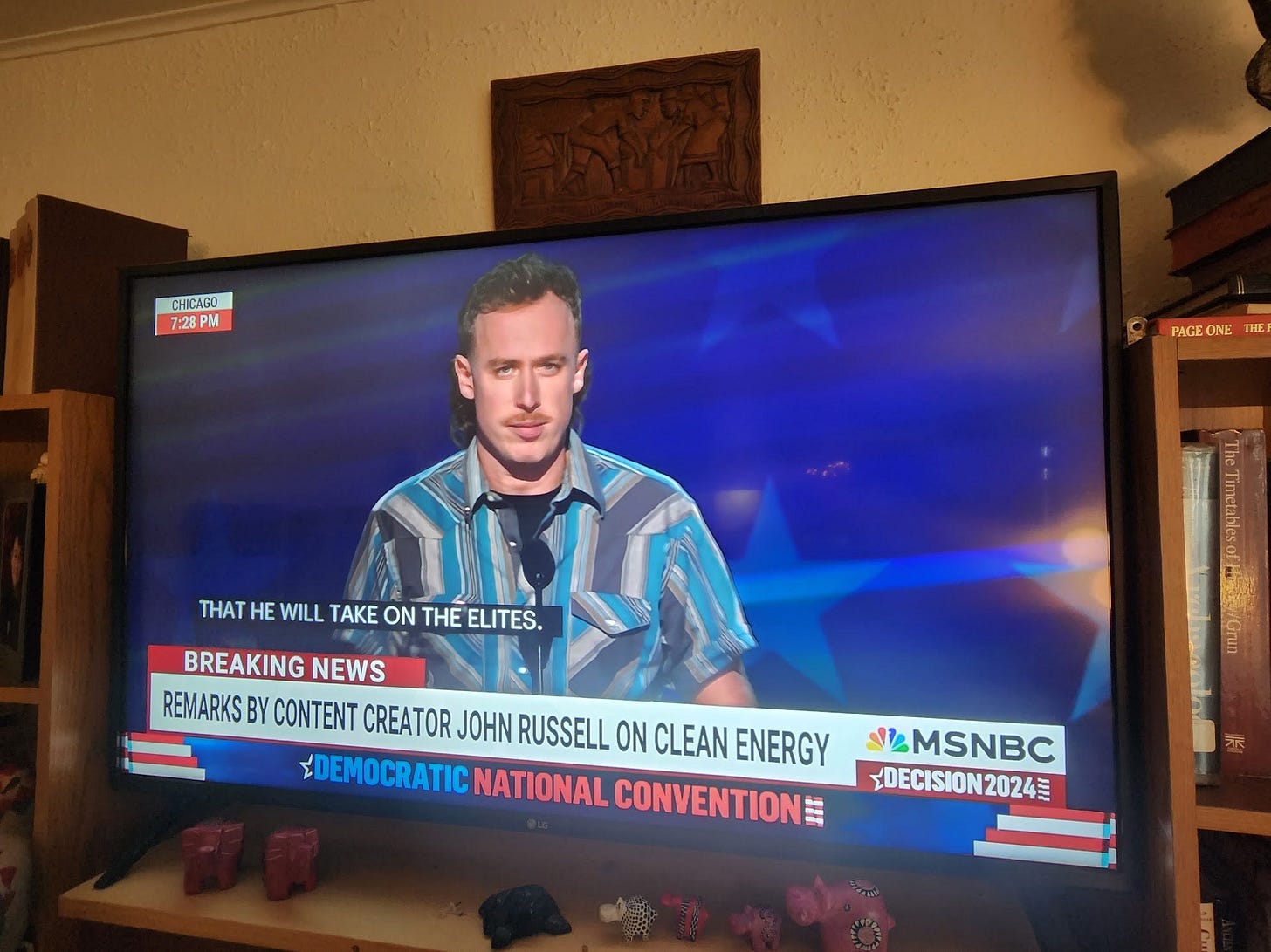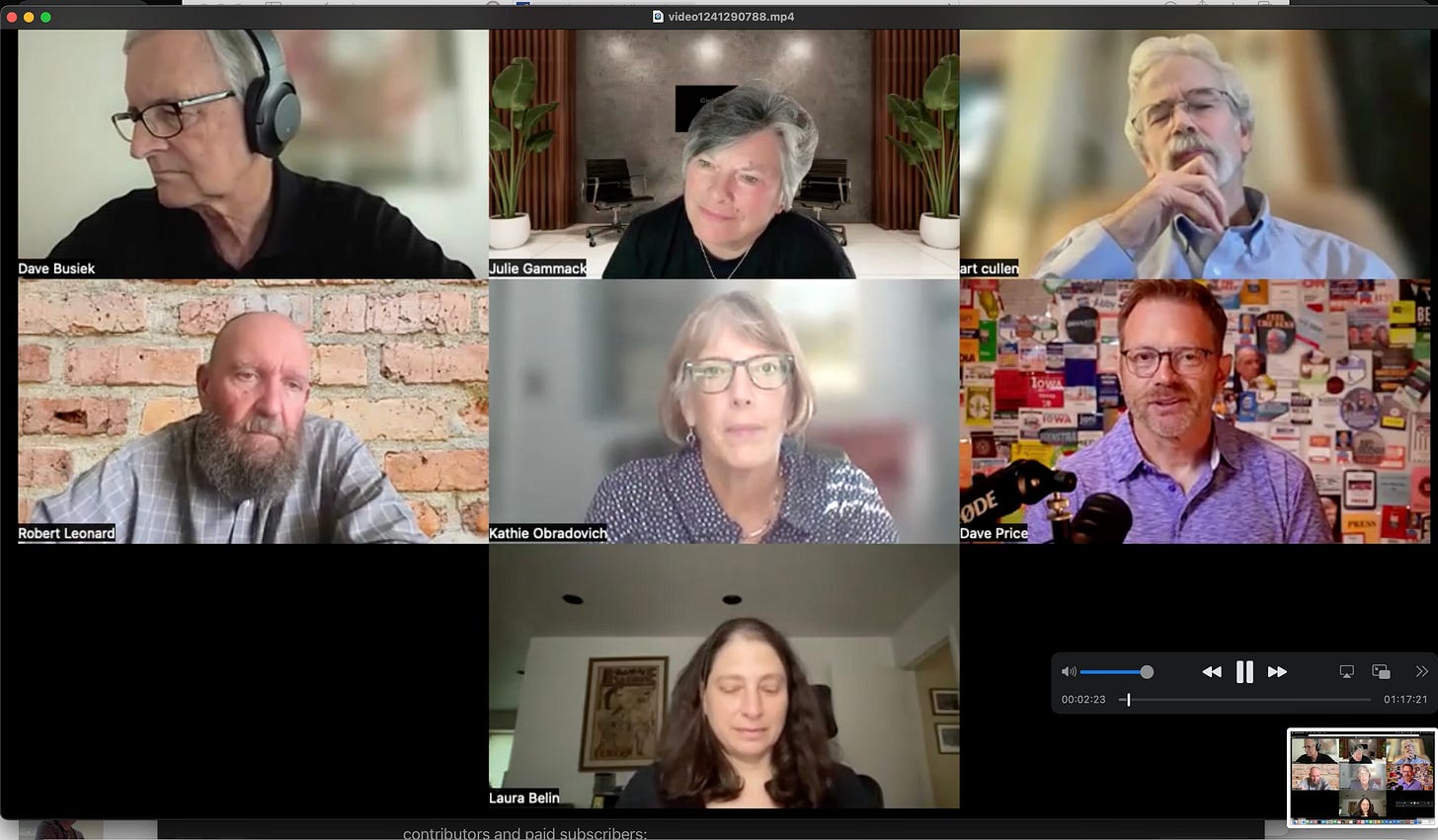A Rural Media Strategy for the Harris-Walz Campaign
The perspective of a small town Iowa radio reporter...
Photo: Then Senator Kamala Harris on July 5, 2019, just outside of Indianola, Iowa.
Before the 2016 Iowa caucuses, I was driving to Des Moines for an early morning interview with presidential candidate Bernie Sanders. I worked for a small radio station based in Knoxville/Pella, Iowa, and the trip to Des Moines takes about an hour. I was nearing the city when I received a text from a Sanders staffer. The text read, “Something came up, and we can’t do the interview. Sorry about that.” So, I turned my pickup around and headed back to nearby Pleasantville for breakfast, wondering if I would ever get the interview.
I ordered coffee and biscuits, sat down, and looked at my phone. Checking Twitter, one of the top tweets on my screen was a nearly real-time photo of Sanders having breakfast with a reporter from the Washington Post.
Bernie had blown me off for an opportunity for an interview with the Washington Post. While that may have made sense to his staff, I knew that hundreds if not thousands of people in my rural county of 33,000 listened to the radio station, and I could count on one hand the local people I knew who read the Washington Post. And he was here to win the Iowa caucuses, and a good interview with me could arguably do him more good than one with the Washington Post. Or so I say.
There has been increased demand for Harris to do some interviews, and I have some advice for the campaign.
It might seem that a retired small-town radio guy wouldn’t have much to offer to a presidential campaign with a professional communication staff. But I’ve learned a lot covering Iowa caucuses since the 2008 cycle interviewing dozens of candidates, and that some communication staff for campaigns doesn’t know how to effectively use rural media--which is a must if Harris-Walz are going to win the swing states.
While most of the national media does a great job, others, not so much. At a 2015 Agricultural Summit in Des Moines, a couple of hundred journalists were there. Each Republican candidate had a sit-down interview with Iowa agribusinessman Bruce Rastetter. After the interview, each candidate would hold a press gaggle. At one gaggle maybe 25 members of the press clustered around Mike Huckabee, and a young national TV newswoman elbowed her way to the front to stand directly in front of him. Huckabee nodded at her to go ahead and ask the first question, and when I saw the look on her face, I knew that she didn’t have a question related to agriculture ready. Huckabee waited patiently, and the woman finally said, “uh, uh, uh, but what about Benghazi?” Huckabee looked surprised, then shrugged, and proceeded to trash Hillary Clinton about Benghazi. At an ag summit.
Press gaggles for presidential candidates don’t do much for rural media or our audience. During the gaggle, the national media edges us out nearly every time. It’s not our thing to shout questions at a candidate, and the coastal media will out-shout us every time. I understand--they are under a lot of pressure, but shouting isn’t in our rural DNA.
Elizabeth Warren understood this. One time in Knoxville, Iowa she expressed frustration that the national media was focused on the polls--the “pollercoaster,” she said. “I’m tired of talking about it.” The next time I saw her in a gaggle she said, “local media first!” Which was a gift. All of us in the local media got to ask the questions we wanted, followed by the national media.
The states that will decide the election are all largely rural. Arizona, Georgia, Michigan, Nevada, Pennsylvania, and Wisconsin, and rural reporters know what questions our citizens want answers to. Other states are now in play. Our listeners, viewers, and readers know us and see us in our communities. They are often our friends, family, and neighbors.
To put it bluntly, in rural America, the national media gets in our way, which means it also gets in the way of campaigns reaching our rural audiences. Harris/Walz need to reach out directly to rural media. Harris knows how to do this--I interviewed her several times before the 2020 caucuses. I presume Walz gets it. Let’s hope their campaign staff does too.
That the team is barnstorming by bus shows they are interested in engaging rural voters. They should be engaging rural media too. The bus ride is a perfect opportunity to engage rural media. I can’t remember how many times I’ve ridden the campaign bus with a presidential candidate to do an interview while a young disgruntled staffer followed in my old beat-up truck to the next town.
The second thing Harris and Walz need to do is invest in leadership and networking in rural America. Every state has a Farm Service Agency and a Rural Development office that are led by Biden appointees. Use these offices to find diverse rural Democratic farmers, manufacturing leaders, and business owners. Have events at their locations. Let them tell reporters how much the Biden/Harris administration helped their operations and their employees. Important connections will be made, great stories will be told to the media, and by elevating these rural leaders now, they likely will continue to lead in the future.
So--it’s simple. Engage rural reporters and rural Democratic leaders. Let them tell the stories.
During her caucus runs, Hillary Clinton’s staff couldn’t find time for me. John McCain’s people laughed at me, saying “we don’t do small market radio,” with a hint of disdain when they said “small market.” We all know how it worked out for Clinton and McCain.
On July 4, 2007, Barack Obama was at a house in Pella for a campaign rally in the yard. By then he was a political rock star on the rise, and media from all over the world were there to cover his campaign. The New York Times, the Washington Post, CNN, Fox News, ABC–maybe 20-30 media representatives from all over.
I felt a tap on my shoulder shortly before Obama began to speak. A staffer asked if I was local. I nodded yes, and he pointed to the back steps of the house. “Meet me there after the Senator speaks,” he said.
Two other local reporters and I spent a half hour with Obama while the national media cooled their heels waiting outside.
After our interview was over, I asked the staffer, “media from all over the world wanted to talk to Obama. Why did you have him talk to us?”
He said, “because today, in Pella, Iowa, to Barack Obama, you are the three most important journalists in the world.”
My last post was on the Democratic National Convention and I shared that my friend John Russell, a former rural organizer for the Elizabeth Warren Campaign spoke. John lives and writes The Holler from Appalachia. Please consider supporting John’s work if you can. His speech was amazing. Watch it here.
John Nichols wrote about John’s speech for The Nation in a column titled The Speech That Brought the Class War to the DNC. It’s worth reading.
I’m a proud member of the Iowa Writers’ Collaborative. Please check out our work here. Subscribe! Become a paid subscriber if you can afford it. Please and thank you. We need you. Thanks for being part of the team! Want to buy me lunch or a cup of coffee? Venmo @Robert-Leonard-238.
The Iowa Writers’ Collaborative is now offering our political podcast Iowa Down Ballot. I’m happy to be in the company of legendary journalists offering our takes on the current political scene. It’s a take you won’t see or hear anywhere else. Last week, Dave Price hosted a conversation about the Democratic National Convention with Dave Busiek, Julie Gammack, Art Cullen, Kathie Obradovich, Laura Belin, and me. Thanks to Zachary Oren Smith for producing and to Dartanyan L. Brown (a member of the Iowa Writers’ Collaborative) for providing music.
My friend Spencer Dirks and I have a podcast titled the Iowa Revolution. Check it out!







I hope someone from the Harris-Walz staff reads this and pays attention. Thanks, Bob.
Exceptionally sage advice. And thanks for sharing the vignette about Obama. Speaks volumes. I hope Harris and Walz adopt a similar strategy. I suspect they will.